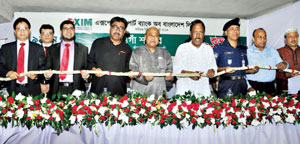In 1978, Noorul Quader Khan, who is also called the father of the country's garment industry, was struggling to start production in his Desh Garments Ltd due to a lack of working capital and apparel accessories although the factory was ready with trained manpower.
A visionary entrepreneur, Khan got 130 men and women trained from the Korean Daewoo Company to take charge of his Desh Garments at Kalurghat in Chittagong. But unfortunately he could not start production when he had seen that out of 35 accessory items 34 were needed to be imported from abroad.
Khan then met the Bangladesh Bank governor and talked about his ideas of obtaining working capital from commercial banks with a back-to-back LC (letters of credit) against the master LC that he received from the buyer. He proposed opening an LC with the commercial bank against the master LC for purchasing yarn, fabrics and other accessories.
This way a unique system of back-to-back LCs came into being in Bangladesh.
Shipping agencies acting as a third party would submit bill of lading (BL) as a proof of transaction of goods between the importers and exporters. This document confirms the importers that they have received the goods from the exporters at the port.
With the help of back-to-back LCs, both the garment and the primary textile sectors or backward linkage industries flourished in Bangladesh.
In case of opening back-to-back LCs for domestic industries, a third party's involvement is not required. As a result, there arises a chance of abuse of the back-to-back LCs which actually happened in Bangladesh. Some dishonest people swindled crores of taka from the banking system by opening fake companies and opening fake back-to-back LCs.
This was the case for a top local company which swindled money from Sonali and other banks. The companies like Hallmark and Bismillah Group followed the same formula and swindled the banks.
Not only this, a group of businessmen have not been paying to the deem exporters in time in the local market by abusing back-to-back LCs. Deem exporters are those who supply accessories from the local markets. They are called deem exports because their supply of accessories from their local factories is counted as imported goods although they were purchased locally.
A section of garment makers buy accessories such as yarn and fabric from backward linkage industries by opening back-to-back LCs. The garment makers do not pay timely to the suppliers as there is no involvement of third party documents like BL by shipping lines in case of international LCs.
In absence of master LCs, in many cases, a section of businessmen abuse this kind of back-to-back LCs under contracts and do not pay to the deem exporters.
The central bank should take special measures to make sure the scheduled banks take the responsibility for their local LC payments in time.
As such, Bangladesh Bank should introduce third party involvement in local back-to-back LCs.
When a scheduled bank opens local LCs or back-to-back LCs it should appoint reputed national or international inspection companies which will confirm through their certification that goods have been delivered to the LC openers according to LC terms.
The introduction of third party certification can stop manipulation of LCs, like the ones done by Hallmark and Bismillah Group, and ensure deem exporters' payment in time if such certificates are considered as local BL like the ones that the shipping lines provide.
But it has to be kept in mind that small accessory suppliers are not required to be under this procedure.
If any disputes arise on the quality of goods, then it could be resolved following the internationally set standards and rules, although currently such disputes are resolved without involvement of any recognised third party.
If the involvement of the third party is ensured for dispute settlement, the importers of raw materials will also enjoy the benefit of timely delivery of goods.
If the central bank formulates policies paying a good attention to the matter and take measures for involving third party in opening of back-to-back LCs, the companies like Hallmark and Bismillah Group will not have the scope to swindle the banks and the local yarn and raw materials suppliers will get payment in time.
News:The Daily Star/18-Aug-2015




